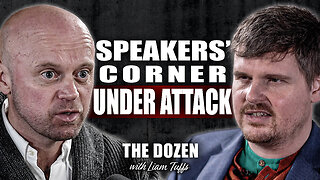Premium Only Content

Idol Killer Interview 3 Anselm’s Contribution to Penal-Substitutionary Atonement
Paul Vendredi joins Idol Killer host Warren McGrew as they continue their examination of penal-substitutionary atonement (PSA), now focusing upon Anselm’s contributions to the model. Anselm expanded on Augustine of Hippo's first three claims by introducing three new tenets. Starting with claim number four, Anselm asserted that any sin, no matter how small, infinitely offends God due to God's high status as the one offended. This idea has been expanded upon by modern atonement theologians who describe any sin as an act of cosmic treason against God. Claim number five posits that all sin can be understood as a debt we owe to God due to having robbed Him of honor. Finally, claim number six states that infants also owe this debt, despite their inability to commit sin. The recurring theme in Anselm's claims is the immense offense caused by sinning against the infinite God.
The hosts explore the background of Anselm's life during the High Middle Ages, focusing on significant events that occurred during his formative years. Anselm lived during a time of great change, including the schism between the Eastern and Western churches in 1054 and the Battle of Hastings in 1066. Just prior to Anselm's birth, the Church had convoked the “Peace of God” and “Truce of God” councils to protect the vulnerable from noble violence. This period was consumed with the idea of social hierarchy, the royal family being at the top, followed by nobles, knights, the middle class, peasants, and agricultural slaves. Despite natural law's emphasis on equal justice under the law, Anselm's atonement theory held that some individuals merited more justice than others. Paul hypothesizes that Anselm's theological background and the socio-political climate of the High Middle Ages influenced his belief in an unequal distribution of justice. Warren concurs with Paul, criticizing Anselm’s for portraying God as more of a ruler than a merciful and just being, thereby distorting God's true nature.
Paul also highlights concerns over anthropomorphic elements in Anselm's ideas, like God being harmed by human actions, and unequal treatment based on societal status. Warren, though holding to a softer position on immutability, points to certain verses in Jeremiah and Malachi as evidence of God's disapproval of unequal weights and measures.
Debate ensues over the interpretation of certain biblical passages regarding the transmission of sins and guilt from parents to children. Paul notes that while Jeremiah 31;30 states that each person bears the responsibility for his own lawlessness, Jeremiah 32;18 implies that the sins of the fathers are passed on to their children. However, Paul notes that 32;18 cannot be read in a literal sense to mean that children inherit their parents' guilt, as this would contradict the former passage. Instead, Paul suggests that the "ramifications" or "byproducts" of the father's sins are passed on to the children, not the guilt itself.
-
 2:32:15
2:32:15
Matt Kohrs
15 hours agoRumble CEO Chris Pavlovski Talks $775M Tether Partnership || The MK Show
83.5K19 -
 28:23
28:23
Dave Portnoy
15 hours agoDavey Day Trader Presented by Kraken - December 23, 2024
98K31 -
 59:29
59:29
BonginoReport
6 hours agoTrump, Murder Plots, and the Christmas Miracle: Evita + Jack Posobiec (Ep.110) - 12/23/2024
111K86 -
 2:59:14
2:59:14
Wendy Bell Radio
8 hours agoNothing To See Here
97.4K56 -
 2:12:18
2:12:18
TheDozenPodcast
1 day agoIslam vs Christianity: Bob of Speakers' Corner
93.9K23 -
 14:36
14:36
The StoneZONE with Roger Stone
1 day agoRoger Stone Delivers Riveting Speech at Turning Point’s AMFEST 2024 | FULL SPEECH
116K27 -
 18:59
18:59
Fit'n Fire
14 hours ago $7.16 earnedZenith ZF5 The Best MP5 Clone available
78.4K3 -
 58:34
58:34
Rethinking the Dollar
23 hours agoTrump Faces 'Big Mess' Ahead | RTD News Update
56.6K5 -
 5:35
5:35
Dermatologist Dr. Dustin Portela
23 hours ago $2.80 earnedUnboxing Neutrogena PR Box: Skincare Products and Surprises!
69K5 -
 11:20
11:20
China Uncensored
23 hours agoCan the US Exploit a Rift Between China and Russia?
79.8K23